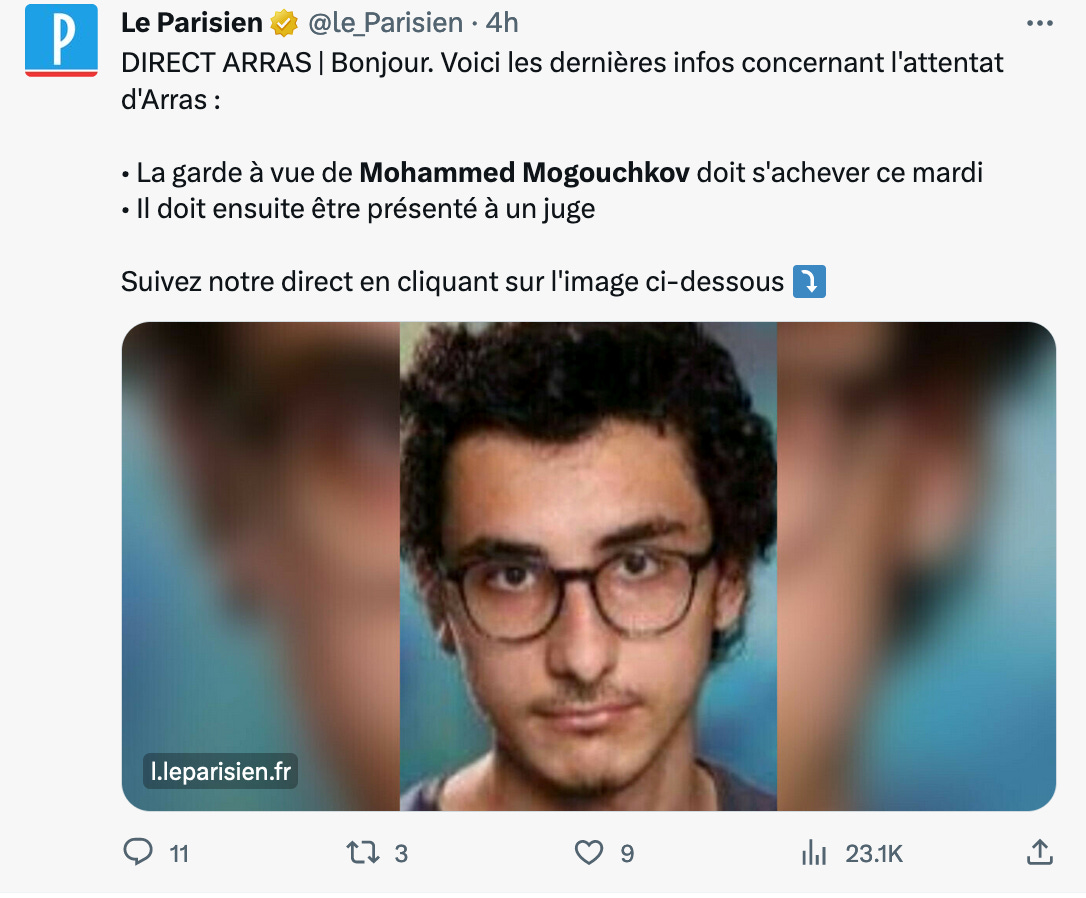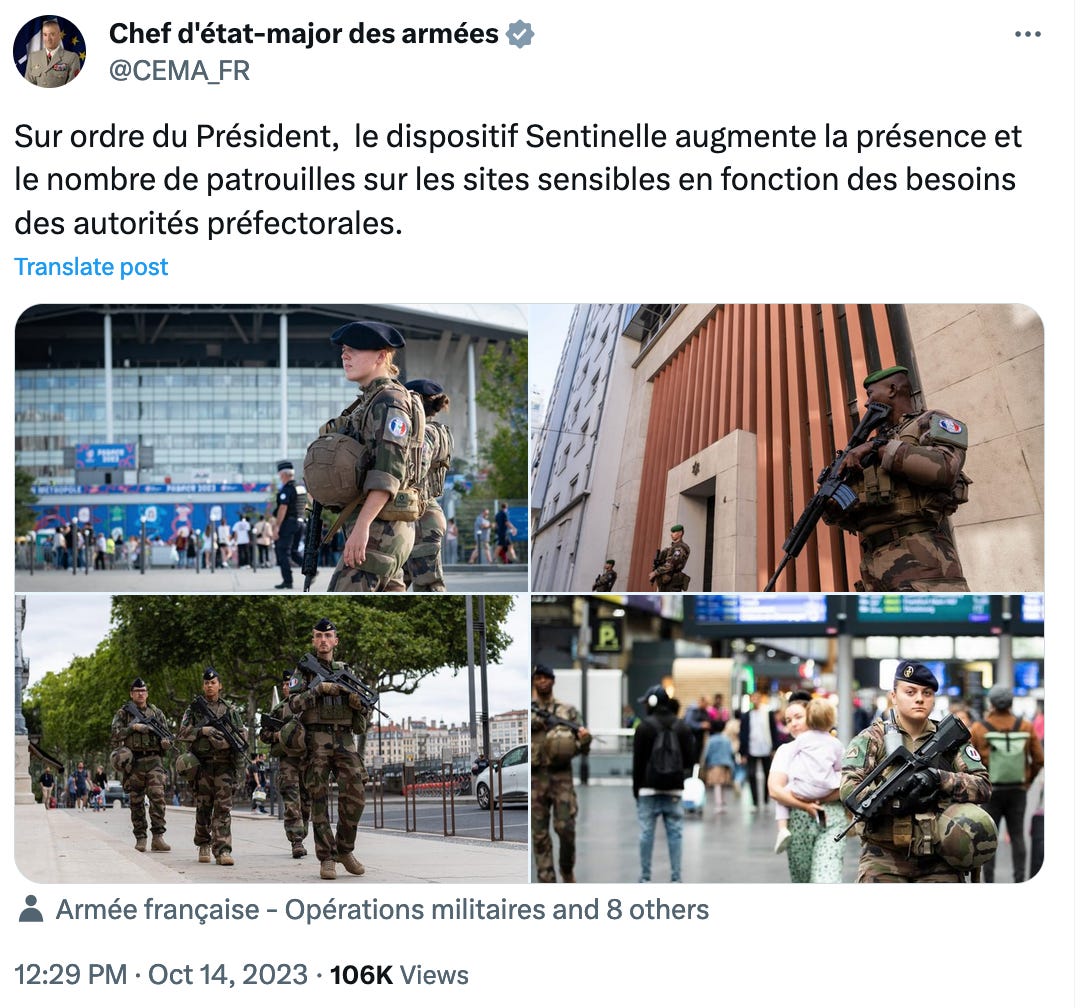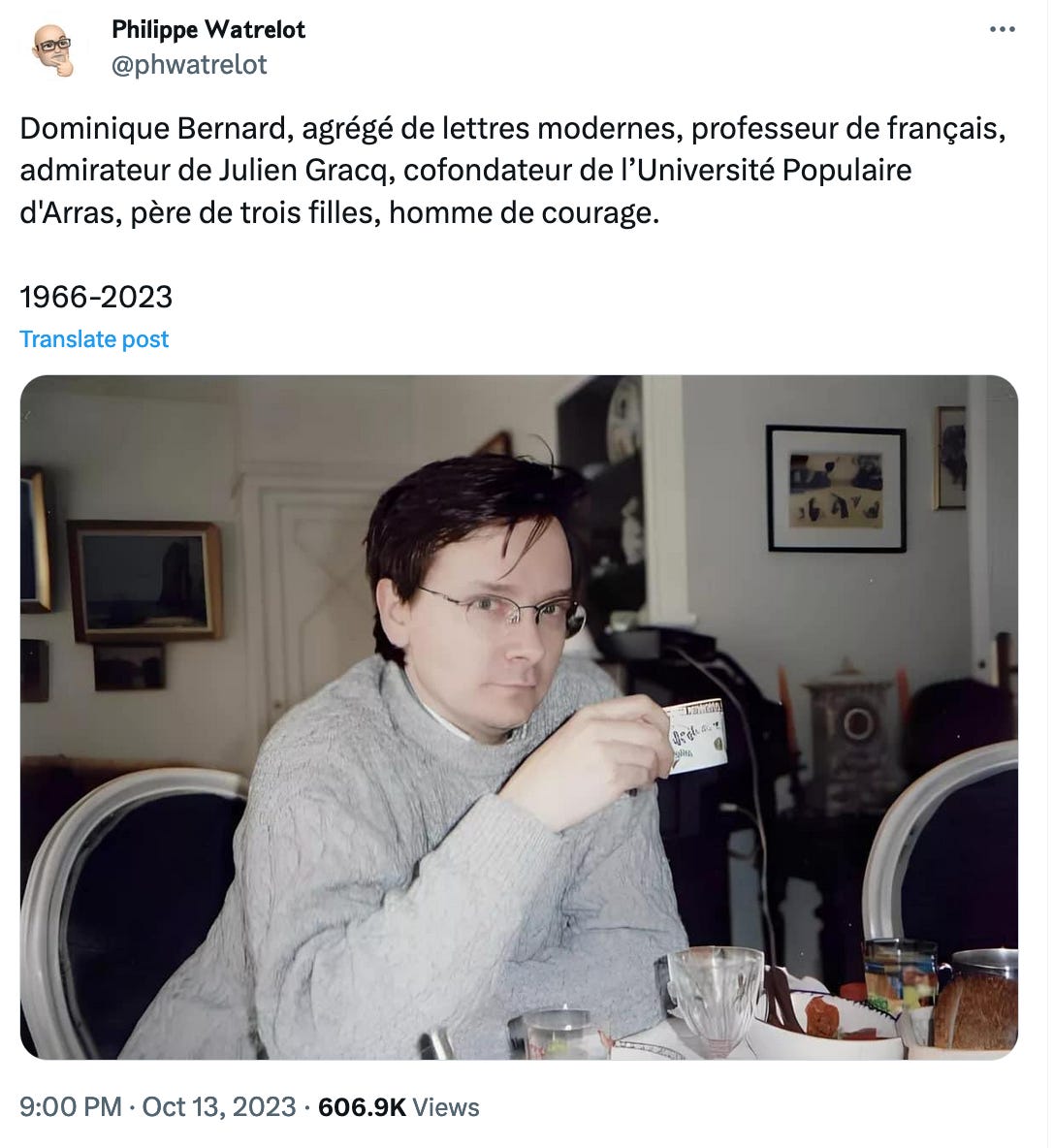France, En Garde...
The shocking murder of a high school teacher has the nation on high alert once again.
The current violence in Israel and Gaza may have felt like a distant conflict at first. But that changed suddenly on Friday when a former student entered a high school in Northern France with a knife and killed one teacher and injured three others.
Certainly, this doesn’t compare to the scale of death being witnessed in the Middle East. Still, given the context, it has placed France on edge as terrorism becomes the center of conversation once again.
The murder has also triggered a wide-ranging debate about just how far the government should go to protect citizens.
This latest drama began when Mohammed Mogouchkov, 20, entered Lycée Gambetta-Carnot in the French town of Arras. Mogouchkov, a former student, stabbed and killed French literature teacher Dominique Bernard outside the entrance to the high school. He then reportedly entered and went in search of a “history teacher” while shouting "Allahu akbar!" (God is greatest), according to witnesses and police.
Among those also attacked were a security guard who suffered several stab wounds and another teacher who suffered minor injuries when confronting Mogouchkov. The three people confronted Mogouchkov in the school courtyard and kept him there until police arrived and arrested him.
It turns out Mogouchkov was already well-known to local and national security forces.
His family had immigrated almost a decade ago from Chechnya. In recent years, Mogouchkov’s activities had landed him on a French national register known as "Fichier S" for being a potential security threat. That status meant he was under active physical and electronic surveillance by the French security agency DGSI.
Still, those efforts did not uncover any plans for a potential attack. Subsequent to Mogouchkov’s arrest, police arrested 11 more people, including several members of his family. His father had previously been deported for suspected terrorist activity.
The impact of the attack was amplified because it comes three years after another French teacher, Samuel Paty, was beheaded by a teenager who confronted him outside of school after a female student claimed she was insulted in class when the teacher showed images of Muhammad.
Following the latest attack, French politicians condemned the violence and extremism. But they also came under intense criticism for not doing more to stop someone who had already been identified as a potential threat.
The Crackdown
That the events in the Middle East should come to France’s doorstep is not surprising. The country has an estimated 500,000 Jewish citizens — the third largest in the world behind the US and Israel — and a 5 million Muslim population. (You are not allowed to officially ask about religion in France, so these are just estimates).
In response to a nation on edge, the government raised its terror alert to the highest level and announced that 7,000 additional police would be deployed. The sight of soldiers carrying high-caliber weapons is already a common one in the streets of France, and their numbers have noticeably increased over the weekend. Even at my local gym, private security guards were added to search our bags when we entered.
The tense atmosphere received another jolt on Saturday when three bomb threats forced the evacuation of the Louvre, the Château de Versailles, and the Gare de Lyon. Visitors were reportedly panicked and in tears as they fled. The threats turned out to be fake, but the fear was, alas, real.
France is going even further. After the Hamas attacks, French Minister of the Interior Gerald Darmanin banned pro-Palestinian demonstrations. Authorities have charged 100 people for acts of antisemitism in France. President of the French Assemblée Nationale Yaël Braun-Pivet was put under police protection after receiving death threats.
Meanwhile, the government is renewing a push for immigration reform amid calls for a tougher crackdown from the far-right. One of the items up for debate: Mogouchkov could not be exiled because he had moved to France when he was under the age of 13. Critics want that rule changed.
The Arras attack has also revived debates on investigators' access to encrypted conversations on platforms like WhatsApp and Snapchat.
Darmanin, the interior minister, said conventional phone taps didn’t reveal anything, but investigators can’t monitor encrypted messages. French police, as in many other countries, have long been asking for “backdoors” that would allow them to follow such exchanges for certain suspects.
“Did the terrorist use encrypted messaging platforms such as WhatsApp, Signal or Telegram to foment his attack?" said Darmanin, who wants to change that law, at a press conference.
WhatsApp and others have steadfastly refused such demands.
"Imagine if a government made it compulsory to install cameras inside all homes. Surely we'd solve a lot of crimes with that!" said WhatsApp chief Will Cathcart to Le Figaro. "But people would be horrified at the idea, and I don't see why it should be any different on the internet. You wouldn't want anyone to be able to keep a copy of everything you write on your smartphone."
French law does allows investigators to take control of a phone, but they have to trick the suspect into downloading spyware first that then records everything happening on the phone.
The government is trying to find other ways to reassure citizens. A Macron spokesman said the president wants his ministers “to embody a ruthless state towards all those who harbour hate and terrorist ideologies” and “called on police to comb through their files of radicalized people who could be deported from France to make sure no one has been overlooked,” according to The Guardian.
This fraught security state will likely endure for the months to come. But even as the nation grappled with these larger isssues, officials at the Gambetta high school were trying to find ways to help their community grieve while honoring the memory of the the teacher, Dominique Bernard.
A note on the school’s website read:
Mesdames, Messieurs,
Nous vous remercions pour toutes les marques de soutien et d'hommage que vous déposez devant l'établissement. Elles seront transportées, régulièrement et intégralement, dans une salle dédiée. (We would like to thank you for all the tokens of support and homage are leaving in front of the school. They will be moved regularly and in their entirety to a dedicated room.)
Chris O’Brien
Le Pecq






